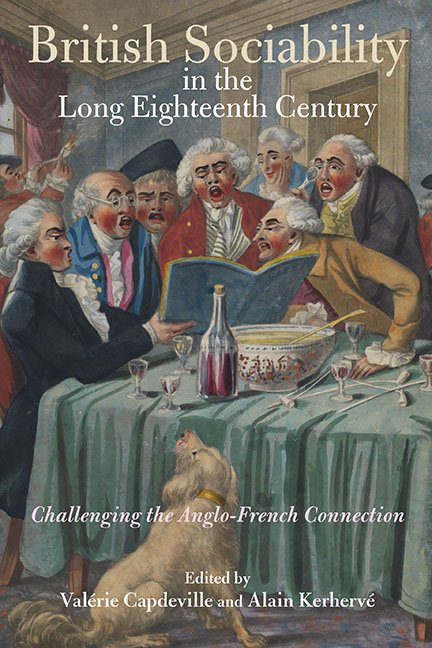Part 3 - Paradoxes of British sociability
Published online by Cambridge University Press: 18 September 2019
Summary
THE LAST SECTION, entitled ‘Paradoxes of British sociability’, highlights the tensions within British sociability, related to social or political behaviour, to gender issues, to public/private dialectics, to the concepts of norm and excess. It examines the mechanisms that challenged the idea of harmonious sociability as a hegemonic form, looking for some signs of the ‘unsocial sociability’ of men and analysing some forms of resistance to sociability.
The tensions inherent to British sociability can be expressed through the conflicting nature of the private and public selves of major social figures like Samuel Johnson and James Boswell, for instance. Both are shown to have been amongst the most sociable of all the literary men of the eighteenth century, both of them delighting in company and engaging in conversation of all kinds. Out of company, though, as Allan Ingram demonstrates in chapter 10, Boswell and Johnson were lifelong depressives, who relished social intercourse and high spirits when in a good frame of mind, just as much as they shunned it and saw it as meaningless during their periods of lowness. Company and conversation, and even the recording of it, helped to keep them publicly sociable.
Kant's idea of ‘unsociable sociability’ is central to understanding the paradoxes of British sociability. In chapter 11 Emrys Jones uses it to trace currents of resistance in pre-Kantian literary works. Specifically, this chapter identifies the ‘friendly enemy’ as an important recurring figure in literature of the Patriot opposition. The friendly enemy offered a model of sociable connection which in some senses anticipated Kant's carefully balanced external and internal resistances, but the figure could also demonstrate the danger of such resistances failing, of friendships becoming either too unsociable or not unsociable enough. A choice of various literary pieces of the friendly enemy in captivity provides a valuable distillation of the tensions underlying the friendly enemy trope and the potential for resistance to give way. The examples chosen by the author aim to emphasise both the precariousness of oppositional rhetoric and the problematic status of sociability within political discourse.
Norbert Col's chapter 13 prolongs the paradox in political sociability. Even if Edmund Burke was an eminently sociable man, he did not readily accept some of the new political developments that were emerging in his own day and age. Nor did he spend much time depicting clubs or salons.
- Type
- Chapter
- Information
- British Sociability in the Long Eighteenth CenturyChallenging the Anglo-French Connection, pp. 183 - 184Publisher: Boydell & BrewerPrint publication year: 2019



